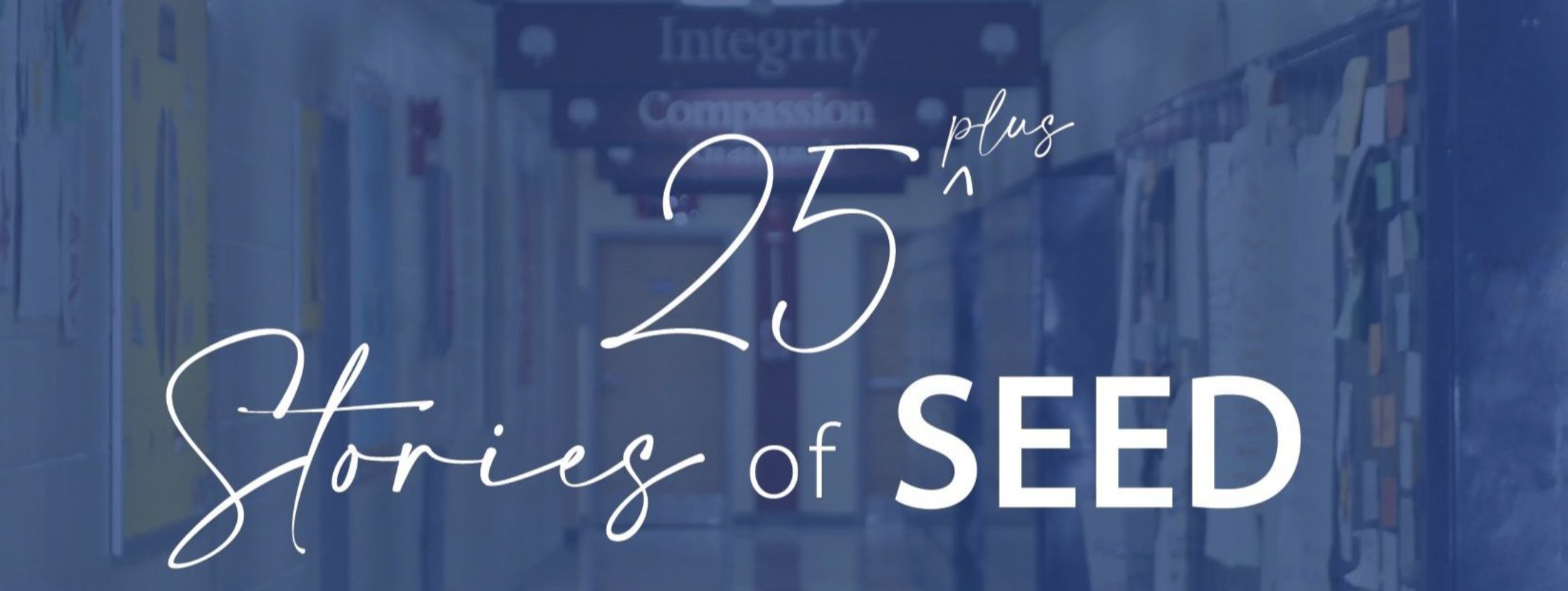Ebony Grant grew up in Washington, DC and attended college in Miami. Her time in both cities gives her a unique perspective on the needs and potential of the students and communities she serves as senior administrative support specialist at The SEED Foundation. Ebony, the SEED Network 2023 Core Values Staff of the Year award winner, is committed to SEED’s mission because she wants every student to have the benefits of the strong support system and educational opportunities she had growing up.
What brought you to SEED?
I have a background in public service. In Miami, I worked for City Year and Public Allies after I graduated from college. When I moved back to DC, I went back to school to get a masters in Public Administration. I knew I wanted to work for a nonprofit and I was looking at several organizations, but SEED stuck out to me because of the mission and the vision. When I was doing my research before my first interview, it just struck me--like, this is literally how I live my life, how I try walk my path both professionally and personally. And from the first interview to now, it just clicked. The work we do is so meaningful and important, especially for communities of color and marginalized communities.
I feel like it’s the best decision that I've ever made professionally to come to SEED and to work with everyone here. It’s very fulfilling to move the mission and vision of the organization forward.
As someone who has lived and worked in Washington, DC and Miami, what is your perspective about why SEED matters to the students and families we serve in those cities?
I grew up in DC. I actually went to school right down the street from SEED, and I had friends that went to SEED and saw the experiences and opportunities they had. I was fortunate, I had a really solid foundation—a Mom who was an educator for 30-plus years who ensured that we went to schools that would ground us and prepare us for the future. But I also saw the struggles of some of my peers who didn’t have that support at home.
To have a place like SEED, that provided a 24-hour learning environment where they could stay on campus and not be subjected to what was going on in their neighborhoods makes such a difference. Because kids can too easily get roped into things that will take them down that path, you know--the school-to-prison pipeline is real. That’s why SEED is important to me, that I get to be a part of that system that tries to deconstruct that for minorities and people of color.
Miami is really different culturally than DC, right?
Miami, which has a large Latinx population, and large Caribbean and Haitian populations, the students that I worked with in those communities, for most of their parents, English is their second language. So a lot of these students are learning on their own how the nuances of being not only first-generation college students, but also first generation Americans.
So the support that is needed to guide them on a path to success is super crucial. How they navigate life, their successes can break generational curses and bring generational wealth into the families. And I feel like the work that SEED does is a roadmap to guiding these students. They may not know anything about what a college or university is like. They don’t know how to get financial aid or grant money. So there are a lot of things that these students need help and guidance with, and the work SEED does helps to propel these students to college, and to college graduation because they have a support system of college success advisors and teachers and mentors. And I think that's needed especially in spaces where students can get into things that are bringing communities down, and not helping the kids within the communities thrive.
That was why I did City Year in Miami. I wanted to provide that type of stability, to be that anchor for students who weren't getting that at home necessarily. To show them there is a way, and it may not be an easy road, but it's a possibility and it's something that you can do too.
The community work that I did with the Opa Locka Community Development Corporation when I was with Public Allies was a really good opportunity for me to go within those communities and also provide my story and say, hey, you know, yeah, I had this privilege, but I want to provide my knowledge to you so that you all have the same access.
Miami, which is based in Miami Gardens the most underserved neighborhoods in Miami-Dade County. Yeah. Quite frankly is shocking to see that you can go from Miami Beach to that within minutes.
What keeps you going?
I would say the team, and the impact. Honestly, the team. Vincena (Vincena Allen, Chief Growth Officer/Interim CEO of The SEED Foundation) said to me the other day, “you always give me a list of everything that you do, but think about the impact. You may be in the background, but that doesn’t mean that everything you're doing doesn't come to the for forefront.” And that's how I’ve been framing my work recently, just asking myself ‘what's the impact of the work I do?’
I see all of the wins across the network: Our scholars that are matriculating to college, I just get so excited hearing about how many schools they got accepted to, how many scholarships they received. Seeing our scholars really thrive and survive while at SEED and post-SEED, hearing all of those stories and knowing that the work that we are doing doesn't go unnoticed. That our students are really benefiting from the work that we do.
As we look back on the last 25 years, we’re also looking ahead. What vision do you have for SEED for the future?
I am super excited about the college matching tech tool. The vision that I have for SEED is that we reach more students outside of our network across the country and provide them with information and data around what colleges and universities will best fit them. That we help them diminish or eliminate the financial burden of higher education, which is such a barrier—quite frankly, it’s robbing people of money that they don't have and possibly won't even see in their lifetime. I know the work we're doing around the college matching tech tool is already super beneficial to our students and our network, and I feel as though once we get the ball rolling and launch, it will bring that same benefit to students outside of our network, especially students that come from low-income communities of all races and backgrounds. So I'm so excited to see where it takes us as a foundation.


